I'm Fine!
The Embarrassment, Shame, Ridiculousness + Very Real Dangers of Falling.
When I was pregnant with Edie (19) and Lucy (20) was a toddler, I crossed Columbus avenue at 97th street, in New York City, to take Lucy to her babysitter’s house. It was cold and icy, middle of winter. I stepped onto an ice patch in a shaded area between buildings, and went down hard. Lucy was in a carrier on the front of me. I was sure I crushed her head when I hit the ice.
Had I given her brain damage?
I didn’t know what to do, but I knew that I was close to the fire house on 100th street and definitely closer to help there, than calling 911 and waiting in the street for an ambulance. I got myself up. Walked briskly to the fire house, Lucy wailing the entire time and me mumbling to myself about what an idiot I am.
I re-told the story of my fall in big gulps, and begged the fire fighters to check her out. I walked away to fill out some paperwork and came back to a circle of young men, gathered around my bald, smiling baby. She was sitting up in the middle of all of them, face flushed and happy, hunky firemen baby-talking her and the sounds of her giggle like the tinkling of little bells. Relief. They recommended taking her to the ER for testing to be sure, but that all signs pointed to no injury.
She was fine.
And ironically, this is what we say when we fall. I’m fine! Whether we are or not. Standing up quickly and shouting I’m fine! is almost a reassurance for ourselves more than the people around us. If I shout I’m fine! it will be so. I’m determining my fate with my words. My kids also do this instinctively when they fall off their bikes and skateboards. They pop right up immediately from their fall with a hardy I’m fine! with an eye toward me, and then are off again. It’s almost a way to keep me from rushing in with my overwhelming mom-concern and treating them like babies. I’m fine! is code for stay the fuck away, parental unit! Or I’m fine! crowd of onlookers, don’t come over here and pity me and make me feel like an even bigger ass.
Falling is one of those things that has different levels of meaning across time. I was in my late 30’s when I fell with Lucy. I wasn’t embarrassed. I didn’t care who saw me. I didn’t feel vulnerable. I just wanted to make sure I didn’t kill my child.
As a kid, falling is nearly a right of passage, expecially if you are Gen X, like me. Our generation was left to our own devices. Falls, blood, head wounds, scabby knees, pie-sized purple bruises were a big part of that. There was no such thing as a playground with soft impact surfacing back then. We had aluminum slides that got so scalding hot in the summer they singed the skin off the back of our thighs and sent us carreening face-first into cement. Merry-go-rounds didn’t have safety speed mechanisms like they often do today, so anyone could make that thing go in circles like a centrifuge, at ballistic speed, plucking kids off one by one and launching them head-first into the surrounding dirt.
We fell a lot. We were fine.
As a youngish adult, I’ve fallen while being ridiculously drunk and laid in the middle of the street, laughing until I cried, with my also-drunk friends, because we were all too inebriated to get ourselves up. I’ve fallen in stilletos and little black dresses. I’ve fallen in jeans and cowboy boots. I’ve fallen in barefeet from stepping on wet rounded river stones in the Adirondacks, while carrying a smoker and several pounds of fresh, cured sockeye. Once, I fell off the roof of my father’s tool shed.
I had a brain tumor removed in 2001 and along with the hearing in one ear, they took out the balance nerve on one side of my face. And now, I’m the parent not allowed to ride a child on my bike for fear I could kill them with my disturbed equilibirum. The fear is that I could fall.
Falling is my life.
And yet, depsite doing so much of it, I’m no longer at ease with falling. Why?
Because this year I’ll be 60. And falling when you are this age has particular ramifications.
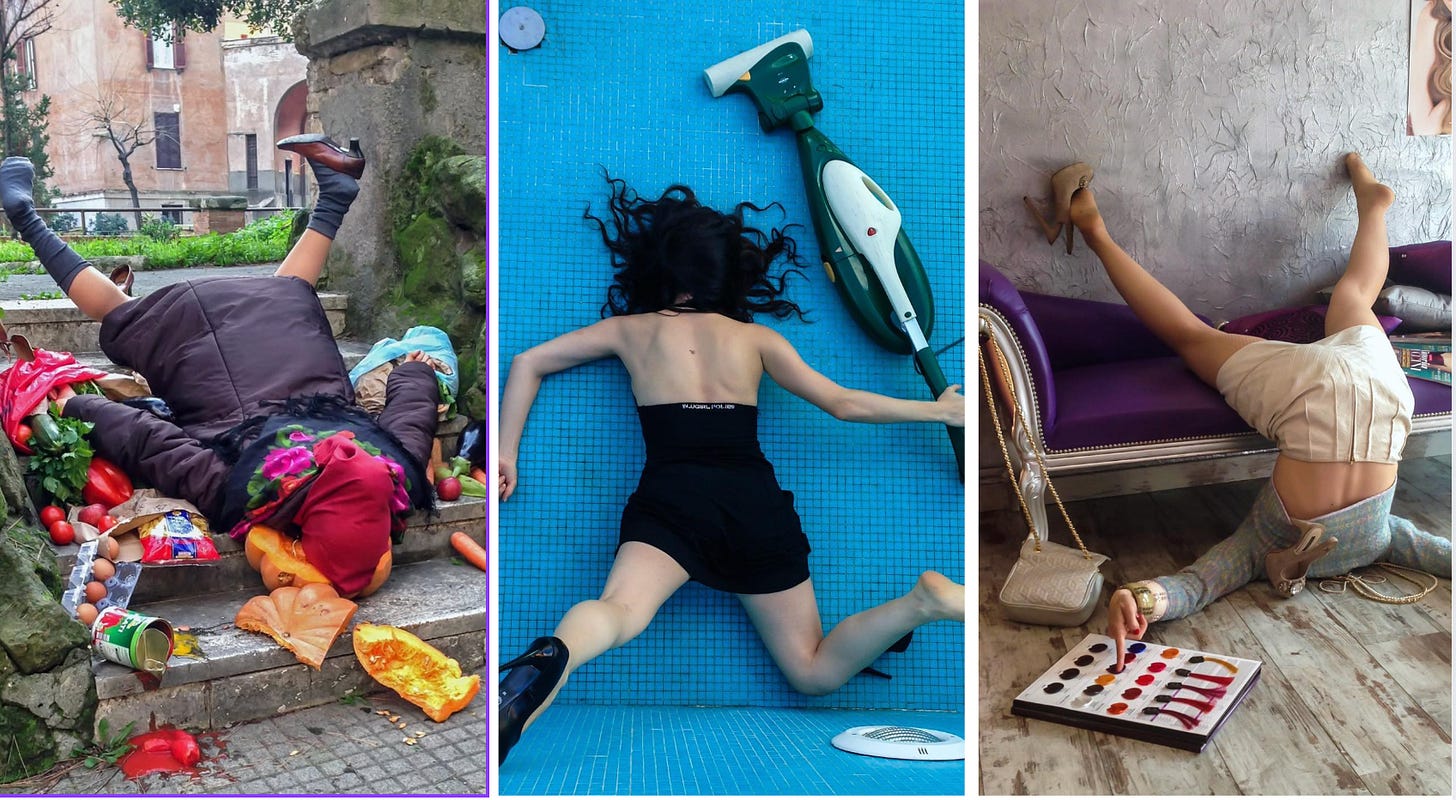
Last year, I appeared at the National Book Festival at the Library of Congress in DC as a featured author. I was signing books and talking to readers. I walked a wee bit away to check my phone for messages from the family. I leaned up against a wall that I didn’t realize moved. I can’t even describe how I fell, because it was so sudden and unexpected, but the door gave way. I was up and then I was down. I slammed the back of my head against the polished concrete floors hard enough that I was dizzy and my skull ached. The air felt thick and murky. I was a little blurry. Some kind authors stopped their book signings to walk me over to medical services - so mortifying to need help - because I was dizzy. I joked with them and the medical staff profusely - and this was a strategy. If I was funny, non-plussed, self-depricating, then they’d know I’m Fine! and I could also throw in the meta-message that I’m strong, youthful, tough as nails, not going to be felled by a stupid fall.
I still haven’t mentioned this fall to David. I’m not keeping it from him exactly - I don’t keep things from him intentionally, and usually if I haven’t said something, I interrogate why and then we discuss it - but I think its because, for the first time ever, I was mortified about falling. And being hurt.
I was mortified that other competent professionals had to stop what they were doing and help me. Another example of how powerful it is to give help and how powerless it can feel to receive help. I was mortified that I needed help. I was mortified that I was ugly in some way, out of control, a body in full-spectrum decay losing its functioning right there in front of everyone, splayed out on a hard cold floor, dizzy and vulnerable, the ultimate victim. Or as author and memoirist, Dani Shapiro, wrote about falling in a 2023 New York Times guest essay called Why My Fall Made Me Feel So Ashamed: Shaken to the core. When we’re injured, we’re suddenly separated from the herd of the healthy.
Surprisingly, there is great shame outside of the herd of the healthy. It means something when you are my age (and older) and you fall. In fact, the statistics around falling are devastating for older people. A fall isn’t just a fall anymore, it’s a marker of where you are in your health and wellness journey. Take this quote from Atul Gwande’s excellent Being Mortal: Medicine + What Matters in the End:
The danger for her was losing what she had. The single most serious threat she faced was not the lung nodule or the back pain. It was falling. Each year, about 350,000 Americans fall and break a hip. Of those, 40% end up in a nursing home, and 20% are never able to walk again. The three primary risk factors for falling are poor balance, taking more than 4 prescription medications, and muscle weakness. Elderly people without these risk factors have a 12% chance of falling in a year. Those with all three risk factors have almost a 100% chance.
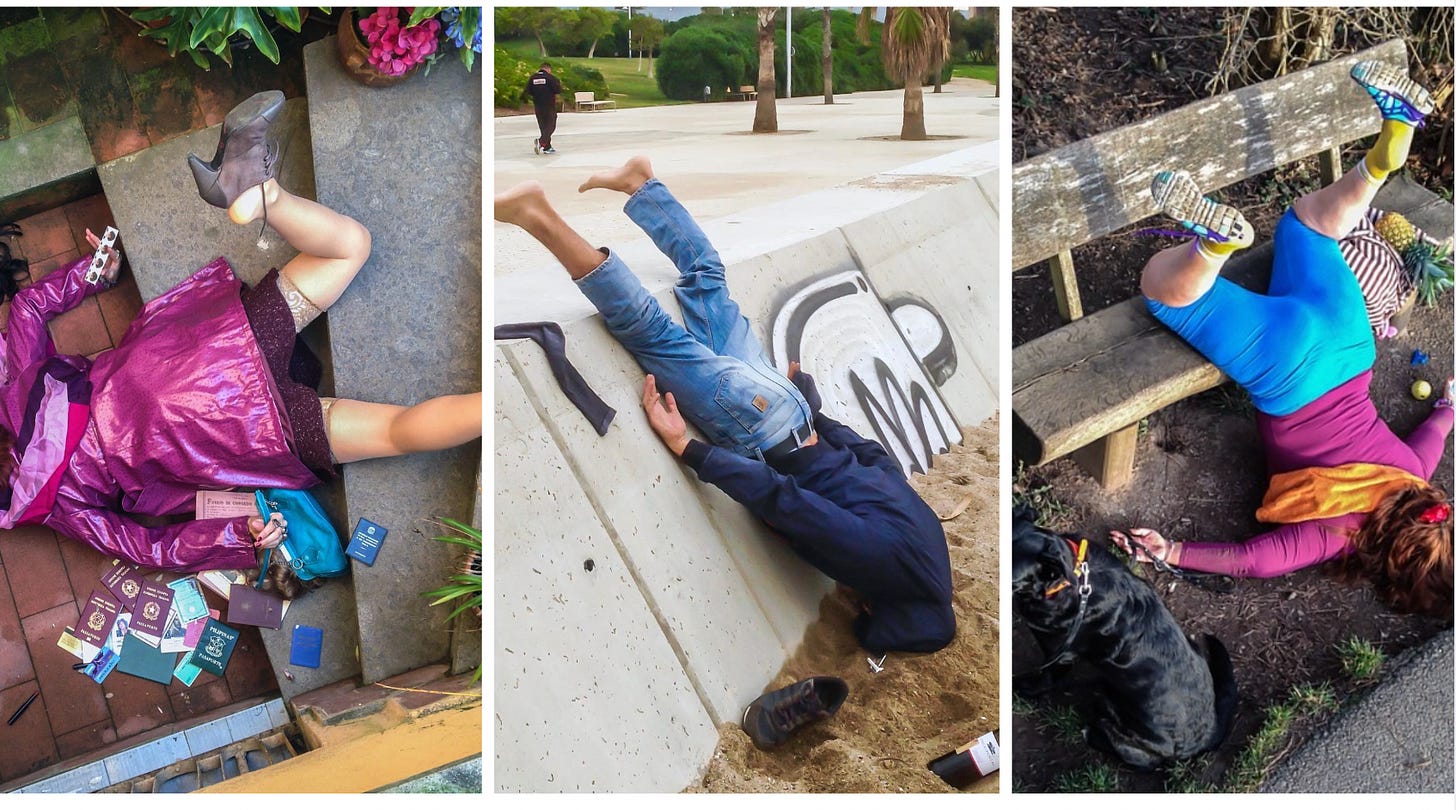
It’s no wonder that falls occupy the thoughts of older people and doctors treating them. In fact, it became a huge concern for lots of folks who read this newsletter because falling is such a vivid signifier of a certain kind of fraility that they may or may not be experiencing.
One reader talked about surfing everyday in her 80’s. She got injured while surfing and went to her doctor. His first question: Have you fallen? She knew why he was asking, but the question made her feel like he thought all older people had the same experiences. She thought of herself as physically exceptional and very focused on continuing this way, and his question challenged that self-image. She chewed him out.
A burning question: If you are 80, and you fall off your surf board and hurt yourself, is that a fall, in the traditonal medical usage of the word? One feels pretty bad-ass and the other feels kinda lame.
And there-in comes the shame. We all want to be bad-ass. We don’t want to be lame. No one wants to feel out of control, weakened, brittle, easily broken, uncoordinated, incompetent. Old in the very literal usage of the word.
The question and its answer are critical because recovery looks different to different people. One person who falls in their 80’s might be happy to simply recover well-enough to continue walking to the store in his neighborhood, while my friend who surfs wouldn’t be happy with that recovery goal. Anything less than being out there on the waves everyday would feel like a failure. Older people often have to fight the biases of their medical teams, because the expectations for older folks can be low.
The focus on falling was something I heard often in comments here. So much so, that some older people admitted to being afraid to tell their families and their doctors about their falls. They don’t want to tell on themselves. To spark the nursing home question. To make people worry. To be fussed over. To be seen as weak and old. To be judged. To lose their independence. To transition from matriarch to patient, powerful to powerless. To lose their place in the family and the world.
I mean I get it. Why would we admit to falling unless we had no choice?
I heard the same from more readers:
Please write about the dreaded falling, when I was younger I was never asked about falls or falling over. Once I was diagnosed with osteoporosis it the first question asked at every appointment was “Have you had a fall?” As if I was constantly going to be tottering around having a fall. I may have tripped over something because I wasn’t looking, but I don’t consider that I “had a fall”.
In the last 3 1/2 years I have fallen three times, breaking bones each time, with long recoveries (casts, titanium rod, etc.) Each time I vowed to never fall again, and I was wrong. (Before those falls, from age 50-to almost late 70’s I was vibrant, also jogging almost 365 days each year, falling maybe once or twice each year, with nothing more than bumps, scratches and some bleeding at most. I do what I can- even take anti-vertigo supplements and try to remember to bring a cane or my walker each time I walk. Yet each time as I improve, I leave them behind. As I write now I’m lying in bed with my latest cast, trying to keep my leg a little higher than my heart.
At what age does 'falling over' become 'having a fall'?
If I hear one more doctor say, “as we get older,” I’m going to scream at them! “Older” is not the same in everyone! And because I slipped down the deck stairs on slippery steps, now, I’m considered a “faller”!
I fell while out walking and fractured my ankle. My foot went in a hole where a brick was missing- stopping my foot completely. I don’t feel like this is the same as randomly “taking a fall” either. Went for a mammogram and a check-in question was “have you fallen in the last three months?” Why? My breasts didn’t drag me down!
I love the exasperation humor! And yet, under that humor is our pained and put-upon acceptance that our own bodies will decline and ultimately fail us. That we could become fallers.
Aging is a loss of homeostasis, a decline in our ability to self-regulate, and maintain equilibium under duress, Dr. Louise Aronson writes in her excellent book, Elderhood: Redefining Aging, Transforming Medicine, Reimagining Life. So thinner bones seem not to matter until you fall, resulting in a fracture you wouldn’t have sustained in younger years when you had stronger bones.
This is top of mind in our house. My wonderful and incredibly supportive mother-in-law, Ann, fell while hanging the laundry in the backyard of her home in Sydney, Australia. This was her second fall. Her doctors discovered that her bones were so soft from chronic osteoporosis, that even though she didn’t break anything, she was never able to get out of bed again because of her soft vertabrae, or even leave her rehab. My mother-in-law was a statistic.
David was changed by two things: 1) his heart attck in 2020 and 2) his mother wasting away in her hospital bed, for a decade, a continent and an ocean away. It sucked. This is why I got my bone scan today, and why David is dedicated to intense exercise, supplements, and a diet that is vegetable / whole foods / protein heavy.
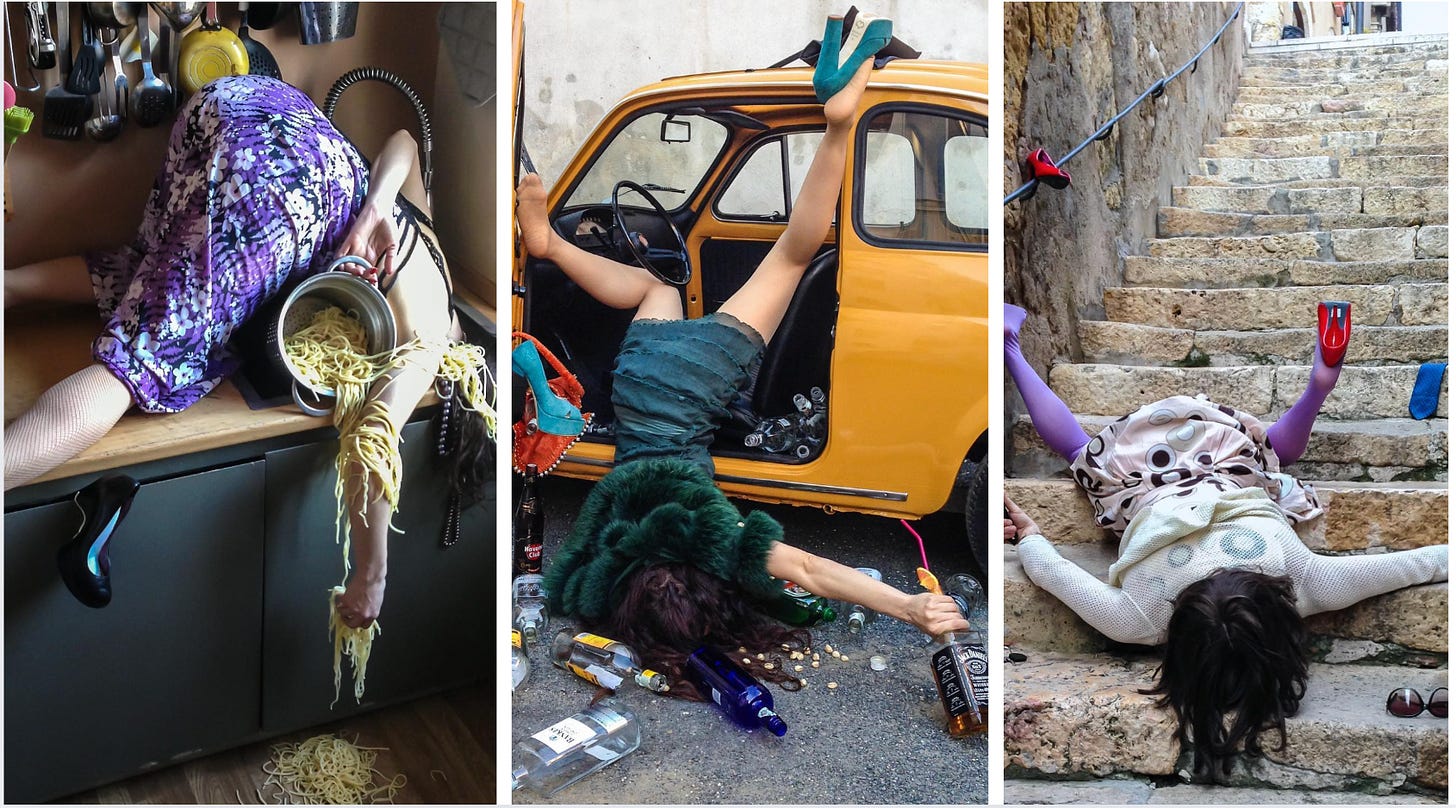
What we know is that falls make us more susceptible to other co-morbidities. As Aronson writes in her book:
…fear and shame (around falling) lead to inactivity and broken social circles and these two things are the two biggest predictors of elder health.
So falling is a big deal. But it is also annoying to be asked all the time, to be reminded that one misstep could bring on a casacade of shit and bury us. And there’s the shame of it, which is really the shame of not being young anymore. Of being fallible and capable of being splayed out on a sidewalk and in need of people to help us off the ground. Ugh, I despise even writing it, as if proximity will make it happen to me. As Shapiro writes in her New York Times piece:
A fall is different from an accident or an act of violence. It is not something done to you but something you have done. I had been an agent of my own near catastrophe.
Perhaps this is the most agravating part of falling - it’s on us. We didn’t see ourselves as fallers. There is no one to bitch to, or complain about, or blame. It’s even completely natural and an expected part of growing older. But still, after writing this essay, I’ve made some decisions. If I fall again, I’m going to look around, see who saw me fall. I’ll pop up quickly and yell I’m fine! with a hardy laugh. Then, I’ll crack a few jokes, while they make me promise I’ll go to urgent care. I’ll nod and smile and agree and seem compliant. I’ll thank everyone profusely for their help and concern.
Then, I’ll cover my bruises in foundation and never tell a friggin’ soul.
___________
END NOTES:
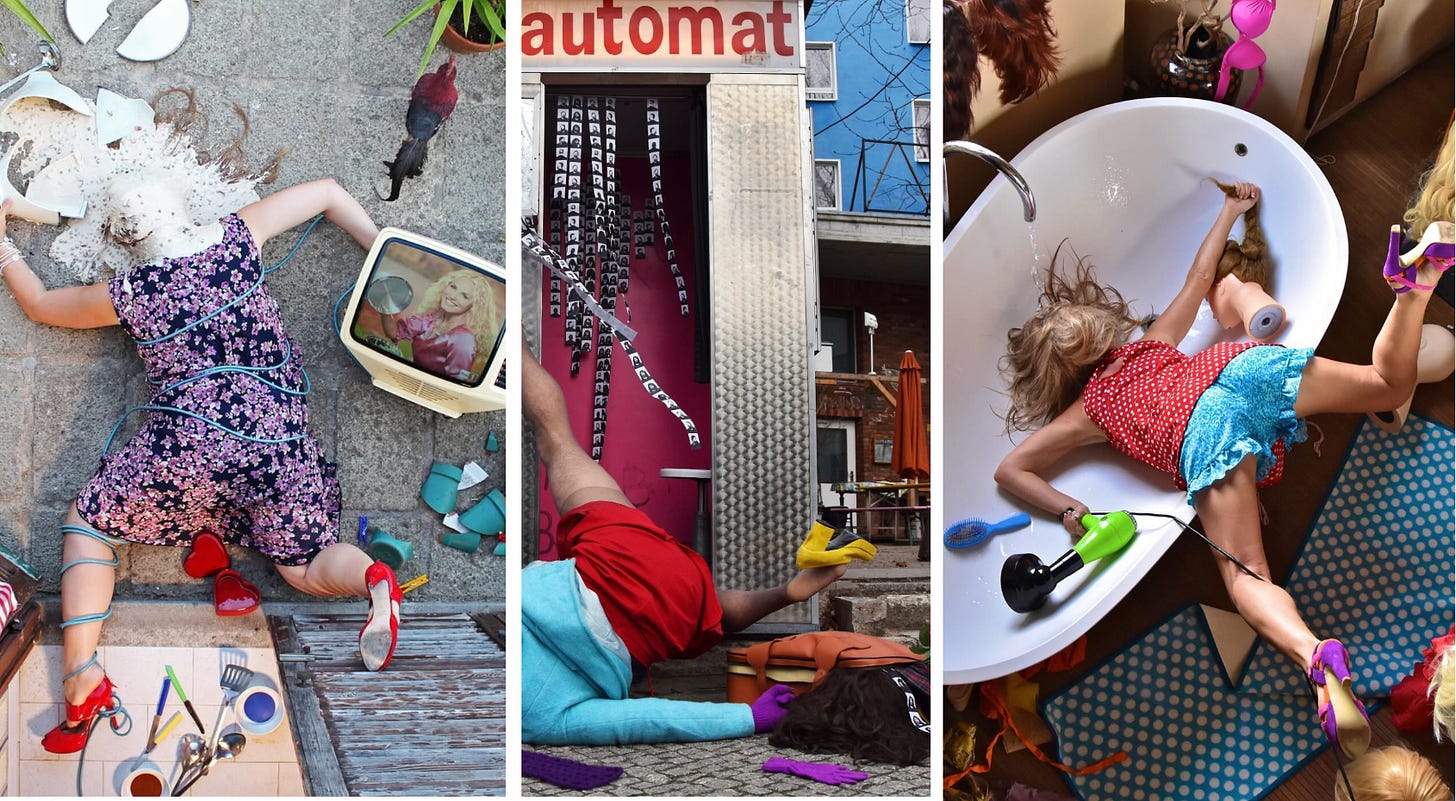
Need a laugh? Check out the uber-funny Nate Bergatze on his parents and falling.
I also just had a fantastic chat with fellow substacker Michelle Andrade about poverty and income inequality and how we can do right by our communities. She is a sharp thinker. Please check it out here and drop a comment for Michelle!
And check out this gorgeous meditation on how we ache to grow old, even as we experience the shame that comes with aging and decline. Beautiful stuff from
.Last but not least, check out artist Sandro Giordano’s work on falling, which brings just the right amount of humor to a tough subject.
Thank you, as always, for reading. xo Kim



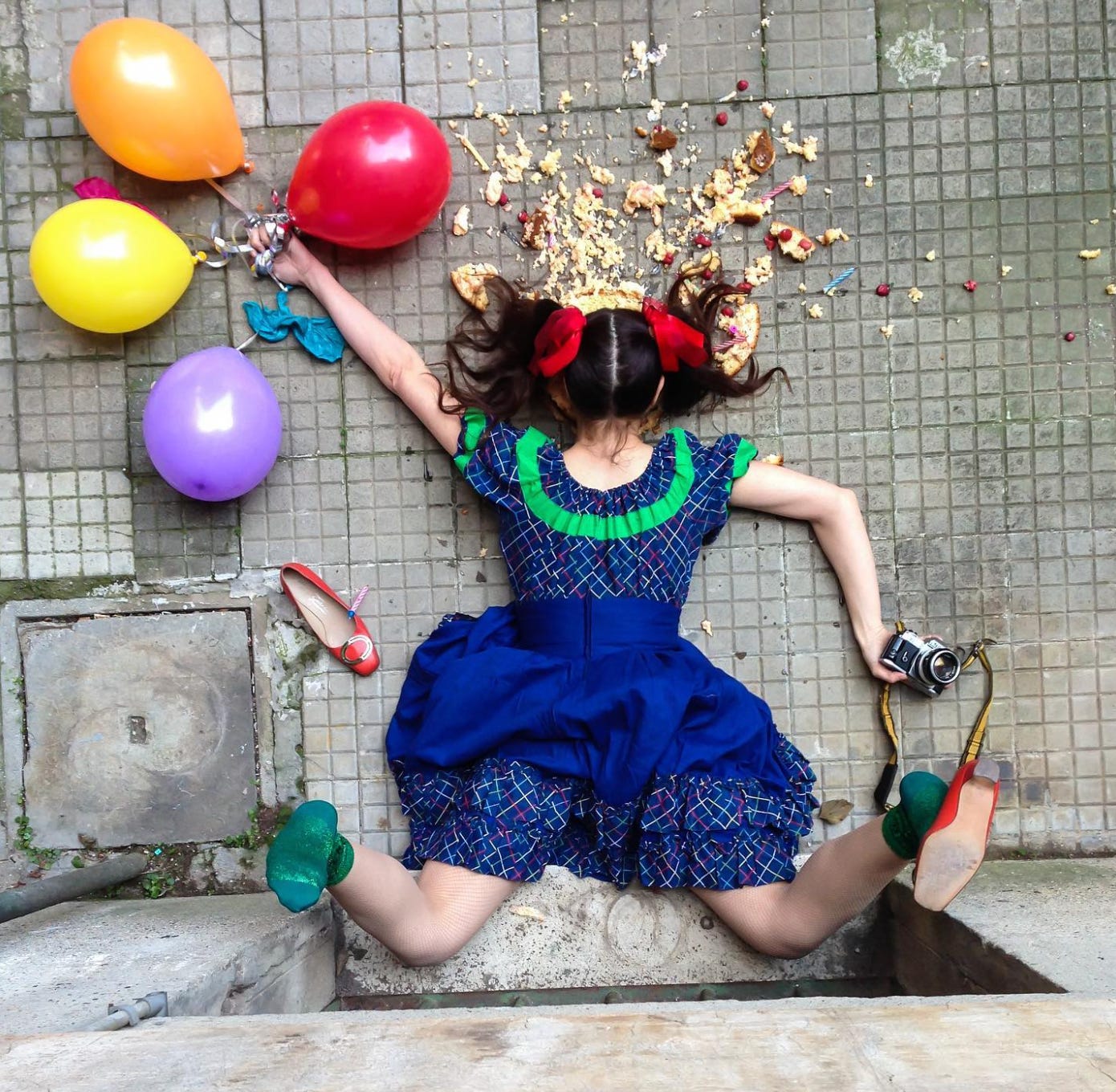


My 91 year old dad says often that the #1 rule of being old is “Don’t fall down.” I am grateful for his humor and ability to ask for help when he needs it and I aspire to be like him as I age. His overall good health I often explain to others as being due in equal measures good genes, good habits and good luck. My mom was getting frail and it was a fall down the stairs carrying a laundry basket and a broken clavicle that really started the ball rolling on complications that eventually led to her death. Let’s let go of the embarrassment and for Old Club where the first rule of old Club is we don’t fall down
I was diagnosed with MS in 2001 at the age of 30. I joked at the time, "well at least I have an excuse now for being such a clutzy!"
This article touched me though because I DID fall back in June. It took me about 30 minutes before I realized I had developed a significant hematoma on my left shin. My sister suggested I name it.
It's getting better every day but it did remind me mechanical injuries can be the scariest when you live alone. I'm still aghast that my cats didn't run over and help me. Lol
Thank you for giving me some things to consider and think about today!